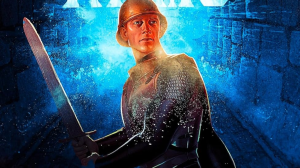Disney Lorcana shifts from competitive to cooperative with its new Illumineer’s Quest: Deep Trouble game, offering a thematic experience and a new style of gameplay to the popular card game. Released as part of the new Ursula’s Return set, Illumineer’s Quest: Deep Trouble is a new co-op version of Disney Lorcana. Instead of racing each other for lore, 1-4 players instead compete with a superpowered version of Ursula, who has also ensnared several “glimmers” of Disney characters to do her bidding. The result is a gameplay experience that offers plenty of challenges but can also be enjoyed by various levels of Disney Lorcana fans.
Videos by ComicBook.com
Deep Trouble serves as the culmination of the first year’s worth of Disney Lorcana story. Within the game itself, a glimmer of Ursula (copies of Disney characters created by magic ink) took advantage of the mysterious flood of ink that created the Floodborn and stole King Triton’s trident and declared herself the ruler of Lorcana. To stop her, a group of Illumineers (people with the ability to wield magic ink and create glimmers from them) and friendly glimmers must team up to stop them.
The Deep Trouble scenario offers Disney Lorcana a cooperative experience, in which each individual player must score 20 Lore before Ursula reaches 40. While players’ turns largely remains the same, they face off against a special deck of cards representing Ursula and her army of ensnared glimmers. During Ursula’s turn, each of Ursula’s existing cards activate, generating Lore for her score, followed by the player activating a certain number of additional cards determined by the difficulty level of the contest. Ursula’s cards still require an Ink cost, but she never spends Ink – cards either go into her Inkwell or they’re played if her Inkwell has a number of cards equal to the Ink cost of the cards that are in play. Many of Ursula’s cards have abilities that activate during play, which often target the players’ glimmers, their items, or forces them to discard the deck.
A key to Deep Trouble is that while it’s a cooperative game, each player is ultimately responsible for getting to 20 Lore on their own. Because the players take their turns simultaneously, there’s some room to cooperate, specifically with the use of cards and abilities that target “chosen characters” (meaning that a player can choose any character, even one that isn’t their own), but ultimately a stronger player can only do so much to help a character that’s struggling to get their deck to pop off. Additionally, Ursula ramps up herself as the game continues, drawing more cards and thus requiring more card management as the game progresses. In addition to standard card abilities, players can also spend Lore to activate certain battleground abilities, although each can only be activated once per collective turn.
One thing I really like about Illumineer’s Quest: Deep Trouble is its varying levels of difficulties. On lower levels, players should be able to get by with pre-built decks, but higher difficulty levels will require more deckcrafting and a deeper understanding on how to counter Ursula’s various abilities. The gameplay style also prevents matches from getting dominated by one player, a typical issue with “cooperative game.” While one player may call the shots and make suggestions, every player still gets to decide what deck to bring, what characters to target, and what to do on their individual turn.
My biggest criticism of Illumineer’s Quest: Deep Trouble is that the presentation of the game itself feels a bit underwhelming. Honestly, Illumineer’s Quest would have benefitted from a traditional game board and higher quality components rather than the paper cutouts and paper layout used to represent Ursula’s board. I feel like the game mode has a lot of playability but I don’t think that a folded piece of paper is going to last more than a few gameplays and it doesn’t really do a good job of tracking Lore given that the tracker pieces will slide down the paper if it’s not perfectly flat. The secondary components to Disney Lorcana (ranging from the early Illumineer’s Trove boxes to the gift boxes) have been surprisingly underwhelming and it’s a trend that continues with Deep Trouble.
Overall, I absolutely love Illumineer’s Quest: Deep Trouble’s gameplay and I think it offers a viable cooperative alternative for TCG play that most of its competitors are missing. It not only serves as a way to play Disney Lorcana with your family without beating them down, but it also showcases some of the flexibility within the Disney Lorcana ruleset and opens up potential new avenues for play that are developed by the community itself. I’m hoping the Illumineer’s Quest format is supported by Ravensburger for a long time, both because it’s very unique and opens up a ton of thematic gameplay that ties into the so far underserviced storyline within the game itself.








